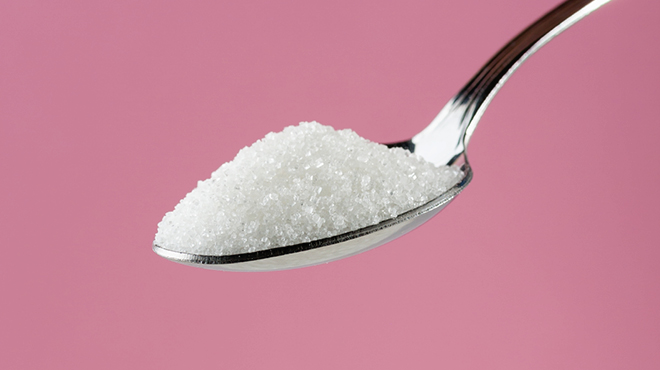A new study, being presented at this year’s European Congress on Obesity (ECO) in Maastricht, Netherlands (4-7 May), suggests that children in the UK start consuming free sugars (those added to foods and drinks and those occurring naturally in fruit juices, honey and syrups) at a very young age, and that many toddlers’ sugar intake exceeds the maximum recommended amount for children aged 4 and older.
This study has been conducted as part of SWEET, a European Commission Horizon 2020 funded programme of research. With the collaboration of 29 research, consumer and industry partners, SWEET investigates the long-term benefits and risks of dietary sweeteners in the context of public health and safety, obesity and sustainability.
WHO recommends that free sugars should not make up more than 10% of daily calories, with 5% or less as the recommended target for optimal health. This equates to around 50g (12 teaspoons) of free sugars per day as the maximum, with 25g (6 teaspoons) as the target for 7–10-year-olds [1].
This new analysis of 2,336 children from the UK’s largest contemporary dietary dataset of toddlers, found that more than a third of those aged 21 months (819/2,336) and at least 80% (374/460) of 7-year-olds exceeded the recommended limit of 10% of daily calories from free sugars. And only 16% (363/2,336) of toddlers and 1.5% (7/460) of 7-year-olds had an average daily free sugar intake below the 5% target.
Importantly, the findings indicate that most of the free sugars in toddlers’ diets come from pure fruit juices, yogurts and fromage frais; while in children, the main sources are pure fruit juices, cakes and pastries, and chocolate-based confectionery.
“Our results suggest that free sugar consumption starts early in life and exceeds current public health recommendations, largely due to the high amounts of added sugar in modern diets”, says Lisa Heggie from University College London, UK, who led the research. “Much of children’s daily sugar intake is hidden in packaged and ultra-processed foods, many of which are marketed as healthy. For example, a standard serving of breakfast cereal can contain up to 13 grams (3 teaspoons) of free sugars, and some yogurts contain as many as 15 grams (approximately 4 teaspoons).”
Children who have obesity are more likely to become adults with obesity, with the associated risk of several serious health conditions including heart disease, type 2 diabetes, and some cancers. Despite evidence indicating that keeping intake of free sugars to less than 10% of total energy intake reduces the risk of overweight, obesity and tooth decay, and a further reduction below 5% would provide additional health benefits, data on free sugars intake among toddlers and children in the UK are limited.
To provide more evidence, researchers analysed data from the Gemini study. This study is led by Associate Professor Clare Llewellyn at UCL, and has been following 2,400 British families with twins born in 2007. Parents were asked to complete 3-day eating diaries for 2,336 children when they were toddlers (21 months old), and again for a subsample of 460 children when they were 7 years old. Researchers calculated average total daily intakes of energy and counted any free sugars from foods and beverages. The study did not include zero-calorie sweeteners or the sugars that occur naturally in whole fruits and vegetables, and dairy.
The results from the Gemini cohort (@GeminiResearch) indicate that the average UK toddler consumes more than six teaspoons (25.6g) of free sugar a day; and by 7 years of age children are averaging almost 18 teaspoons (57.4g) per day.
According to Heggie, “We need to make sure that children are encouraged to drink water instead of beverages high in free sugar to reduce risk of childhood obesity and to improve child dental health, and to choose foods that don’t contain added sugars like fresh fruits and vegetables. Parents would also benefit from clearer nutrition information on these foods to make them aware of the hidden sugar. It is misleading and unhelpful for products to make claims such as ‘no added sugar’, when the product contains high levels of naturally occurring free sugars because it has been processed (e.g. concentrated fruit juice).”
She adds, “More also needs to be done by governments and food manufacturers to reduce the free sugar content in foods and beverages and to reformulate products that are significant sources of added sugar in children’s diets such as yoghurts, juice drinks, cakes and chocolate-based confectionery.”
The authors conclude by highlighting the need for more research to examine the link between free sugars intake during toddlerhood and childhood and the risk of obesity in later life.








